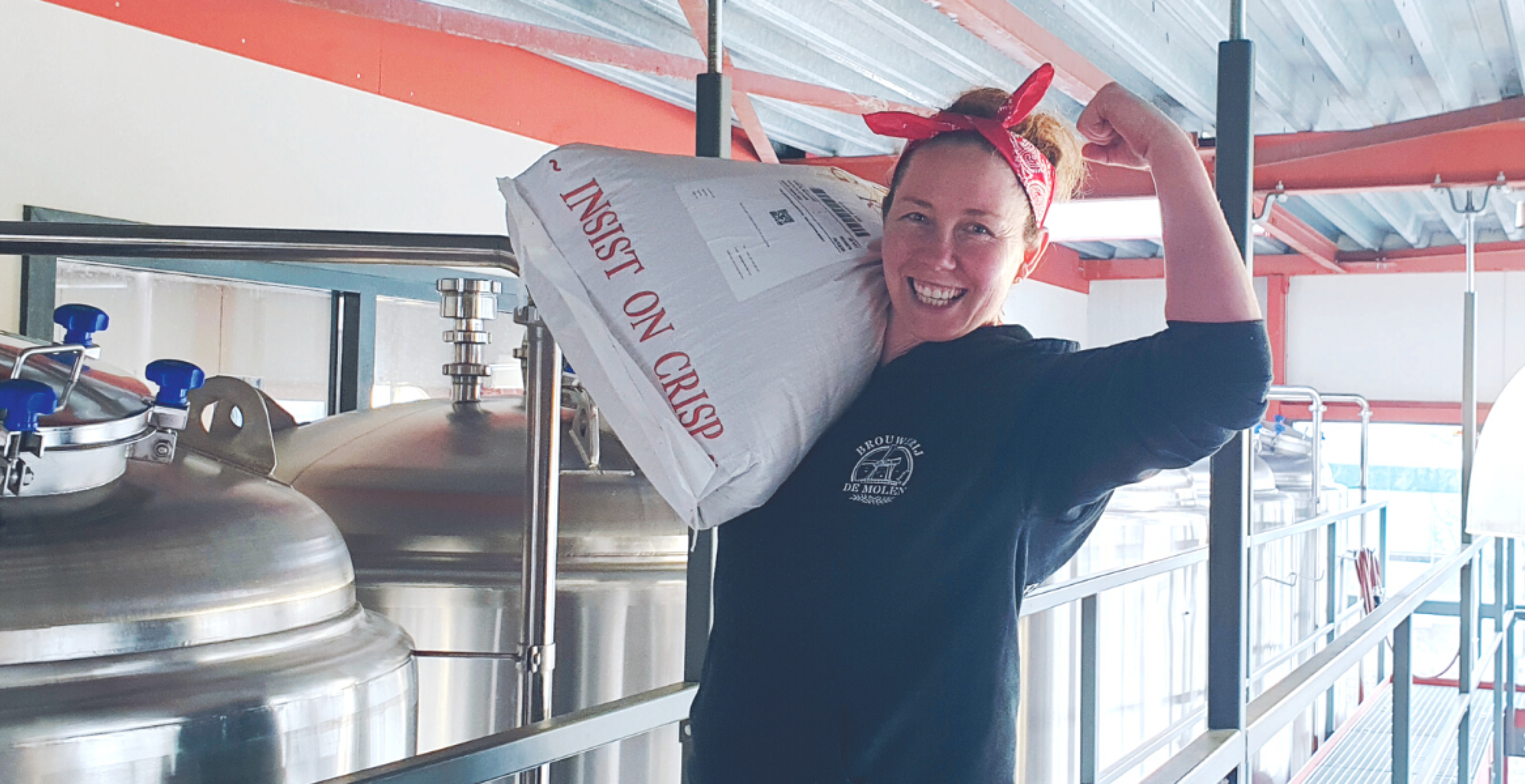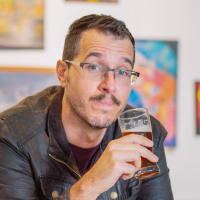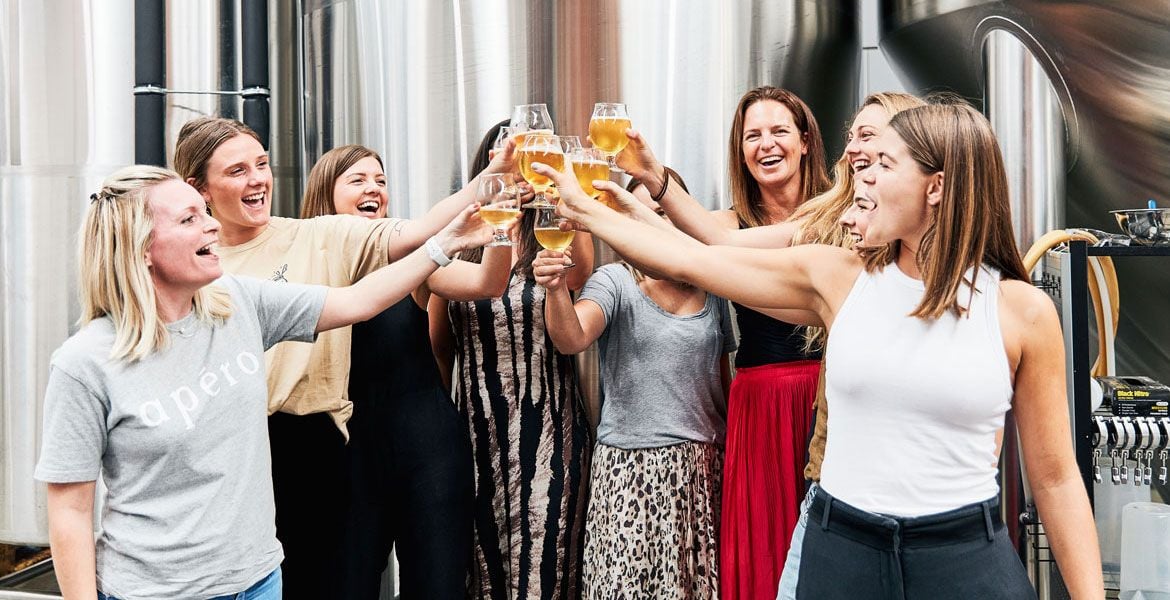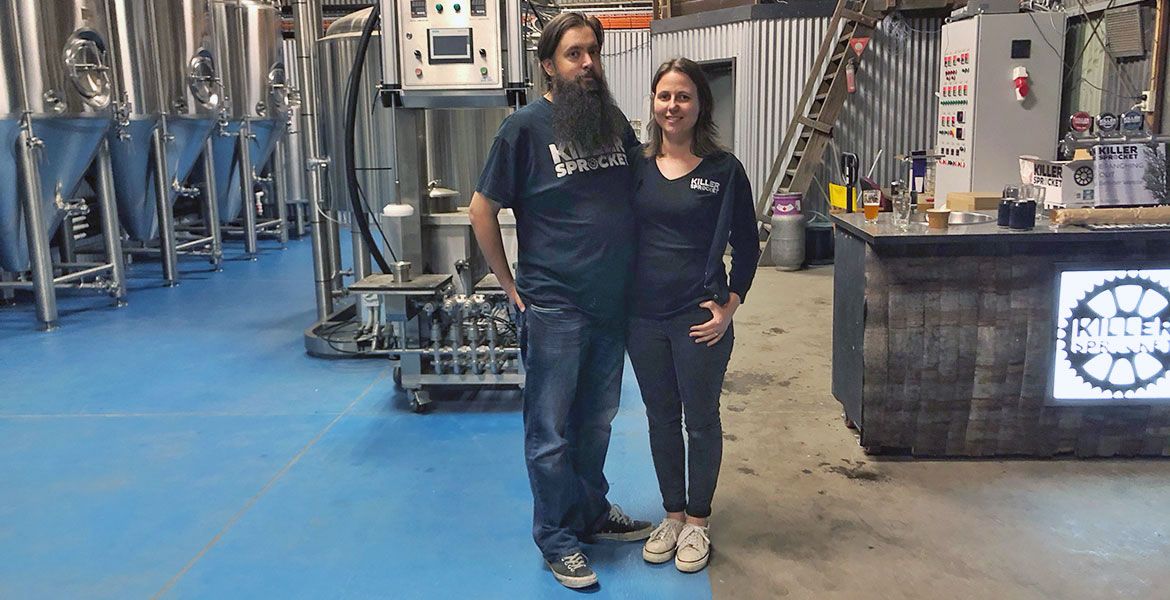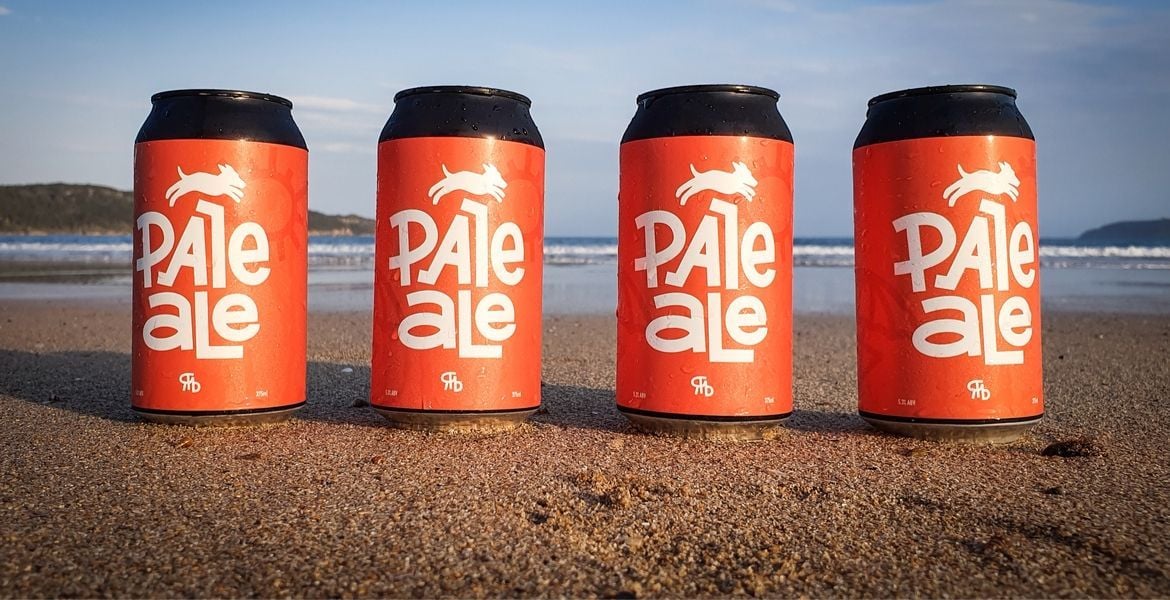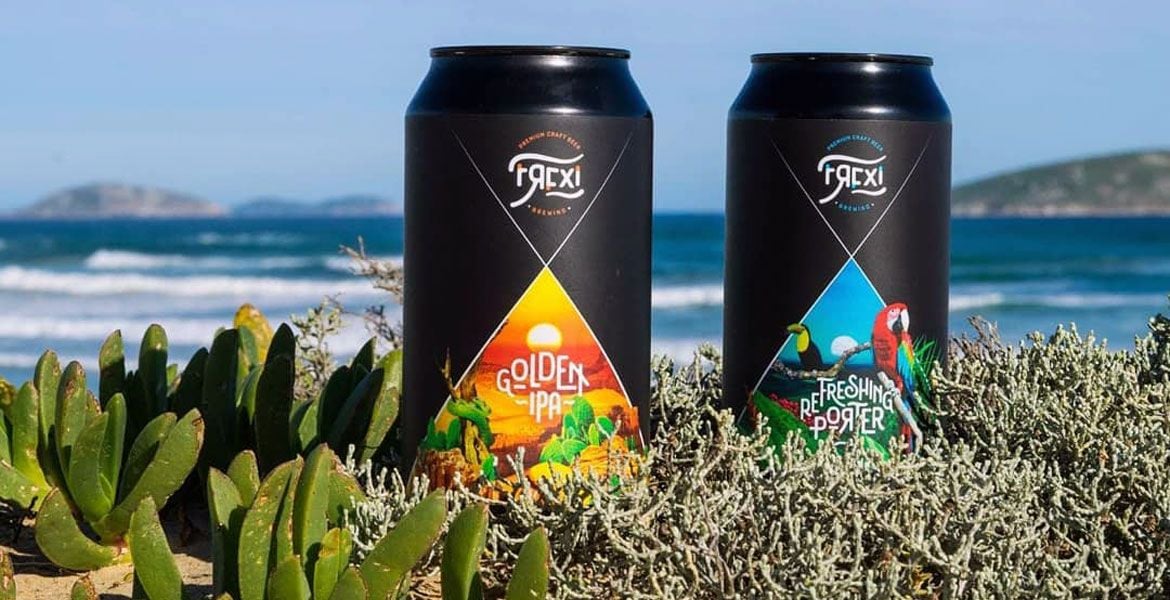Contract brewing has often been looked down upon as bad for the industry, or a corner-cutting means of getting into the industry. But Emily Tankey’s new venture, Better Together, is unashamedly founded on contract brewing and she's happy to talk about why.
For context: Emily is the owner of Bosc, a small bar that’s been pouring good beer in Brisbane’s West End since 2013; she brewed for Brouwerij De Molen in the Netherlands for several years; the first beers she made for Better Together were three imperial stouts (if you don’t count the cherry barley wine she made back in the Netherlands); and she’s working towards having a barrel facility for fruited sours and imperial stouts.
Even before you taste her beers, you can be confident this is not a second rate operation, and that no corners are being cut. (And I can confirm that opinion will not change after tasting her beers.)
When I first arranged a time to interview Emily, it was because I was keen to hear about Better Together. But our conversation branched out into enough other topics that we arranged to catch up again the following week to finish talking.
As well as discussing Better Together – how it began, where it’s at now, and Emily’s hopes and dreams for its future – our chat covered Emily’s journey from professional golfer in the US to brewer in the Netherlands, how she developed as a brewer at De Molen, the importance of female ownership in brewing, and a need for distinction between different kinds of contract brewing.
ON BETTER TOGETHER
“When I opened Bosc, the idea was that I always wanted to run my own beers through it.”
This dream from 2013 took hold before Emily had any professional brewing experience, and at a time when she was time poor as a small business owner. But, at the end of 2022 – just shy of a decade later – a handful of Better Together beers made their way onto the taps at Bosc: a red(ish) IPA, a blood orange and passionfruit sour, and a few variations on her flagship imperial stout called Hopes & Dreams (which is an optimistic parallel to De Molen’s Hel & Verdoemenis, or Hell & Damnation).
“My focus is on two streams of beers. [One is] ‘no frills’ – things that are drinkable, you can have every day. Focus on drinkability, lower price point," she says. "As far as fruited sours go: not wild, not lactose, no pastry sours in the no frills stream.”
In case you hear "no frills" and zone out, it’s worth pointing out that Emily defines this stream of beers as “the things I’d like to do classic styles of: imperial stout, pilsner, red IPA…” In other words, more about straight styles than experimentation and exploration, but by no means restricted to pale ales and session lagers.
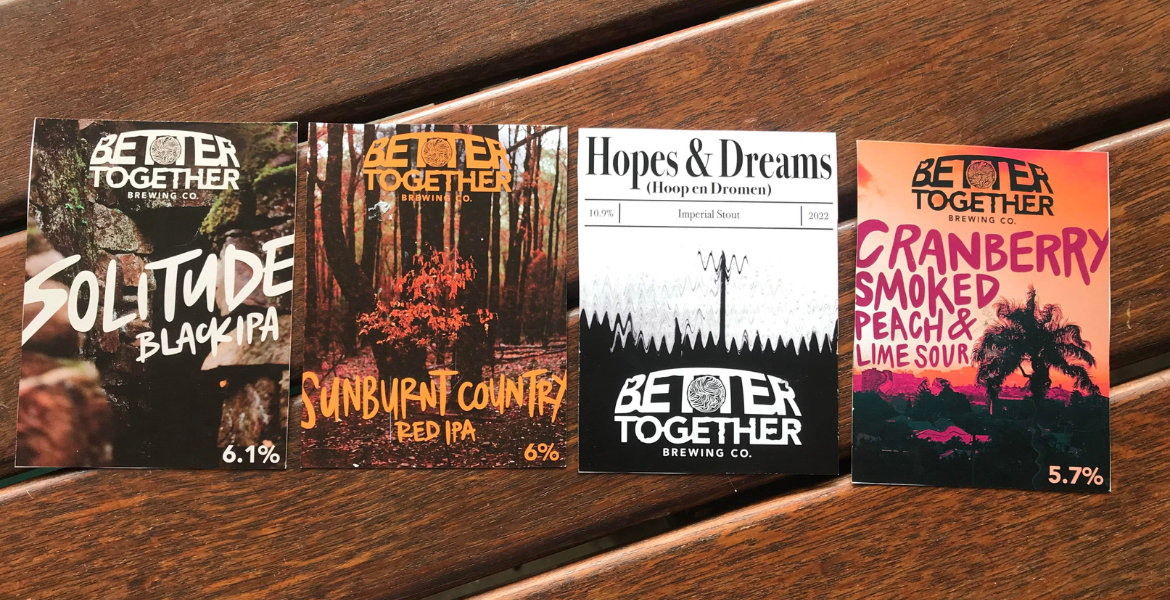
As much scope as there is in the no frills stream, however, it’s the other stream that has Emily truly excited: the beers that I’m calling "extra frilly".
“Then we’ll flex. Have fun. Pastry sours, barrel-aged beers… things I don’t expect to be higher volume sellers," Emily says.
“I dream about having my own fruited, barrel-aged sours. I drink them, and I love them, and I dream about making them. Nuance and elegance, a balance of acidity and complexity. That is what I can’t wait to do.”
If you can’t tell, it’s this side of Better Together that really puts the glint of excitement into Emily’s eyes. She’s currently waiting on council approval for her barrel facility, which will sit on her family’s farm out in Dalby.
"I’m hoping approval will come through within two months, hoping to lay down the first barrel in six months. Depending on the freshness and quality of the barrels, maybe nine to 12 months after that I’ll be putting my first batches [of barrel-aged beer] out.”
In the meantime, we’ll have to settle for Emily’s mundane bread-and-butter beers like spiced biscuit imperial stouts and cranberry smoked peach & lime sours…
ON EMILY'S JOURNEY INTO BREWING
I always love hearing what brewers did before they became brewers. When at some point Emily mentioned something about engineering, I asked: “Is that your background? Engineering?”
And she answered: “No, my background’s finance and accounting. And special education. And professional golfer.”
Later in the conversation, she also mentioned that she’d sat the GAMSAT because she wanted to study medicine, but gave up that path of study to open Bosc – a loss for medicine, perhaps, but a win for Brisbane beer.
(Emily conveniently left out that she used to write Mills & Boon romance novels as well.)
But in and around all of this, beer always seemed to be lurking in the background, whether it was playing with her brothers’ homebrew kit – “I was a science nerd. Just pissing about with fermentation was really fun!” – or pouring beers on the side while she played golf professionally in America.
Once Emily was back in Australia (an injury cut her golfing career short) and had opened Bosc, beer had cemented itself in her life. Discovering Boatrocker* sparked in her a love of barrel-aged beers, and a desire to make her own started bubbling up. There was just one problem: the difficulty of breaking into the brewing industry in Australia at that time.
“I’m so happy to see Abby and Em at Sea Legs, and Ally at Range, Kat at Newstead," she says. "A lot of that comes about by the TAFE course.
"Ten years ago, there was only the Ballarat course. The pathway for an actual job in the industry was harder to get into, because there was no way to get experience… anyone who had a job position, it was for their mates.”
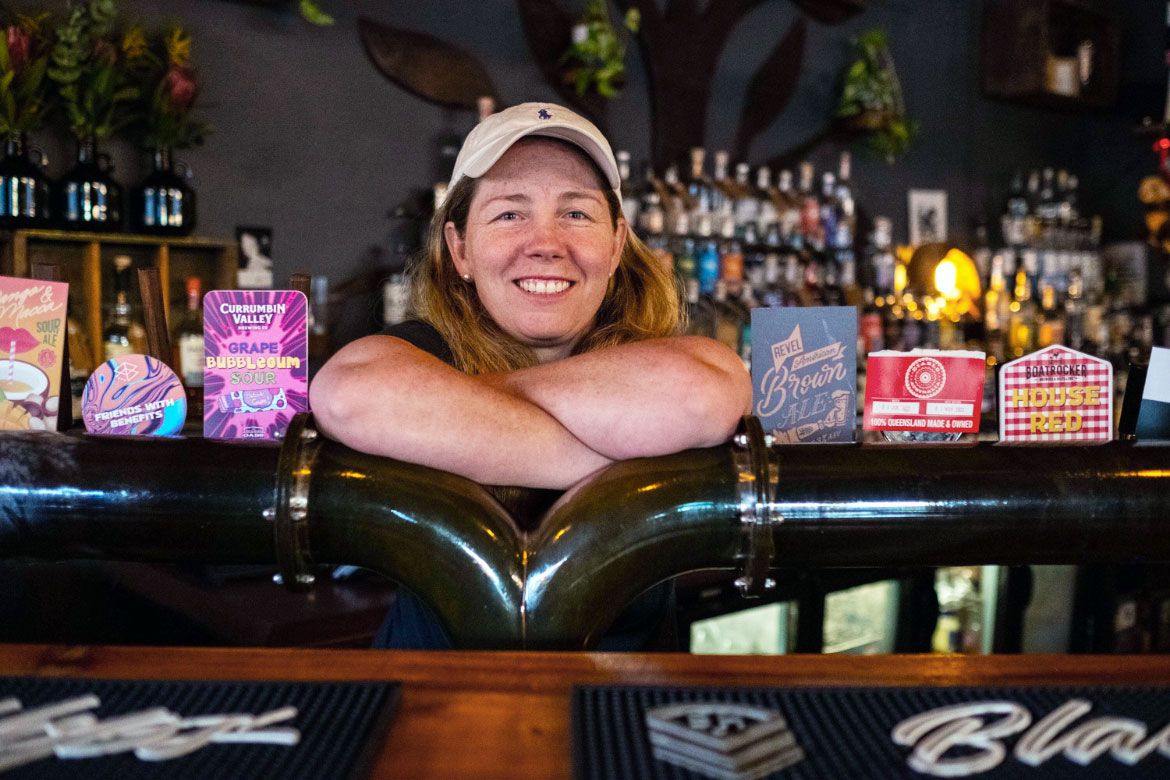
So Emily moved to the Netherlands in 2016, and made the decision to go for it there instead.
“I said to my wife, ‘I am going to brew!’ I emailed every brewery in the Netherlands… and they all said they had no jobs.”
This initial rejection seemed like a dead end, and for a while it looked like working in a craft beer bar may be the closest she’d get to the brewing industry. But it just so happened that Emily made a friend who knew John Brus, one of the owners of De Molen, and she got the chance to sit down with him.
“He was from my own town,” Emily says. “We had a few beers, talked about getting some beers over here [to Bosc]. Our of sheer frustration, I said, ‘I’m really struggling to break into the industry here. Feel free to say no to this, but if there’s anything I can do at De Molen, maybe that’ll assist me in getting a job in a brewery somewhere else.’”
While there were no job openings at De Molen, Emily managed to sweet talk John into giving her an unpaid internship at the brewery.
“It was a hard slog. I was a mid-30-year-old woman doing an unpaid internship. That was a stinger… I owned my own business! That was a huge ego check. I was scrubbing floors for six months.”
But hard work pays off, and all those other clichés that are untrue just as often as they’re true. Emily did get a job brewing with De Molen and spent a few years honing her craft there.
ON BREWING AT DE MOLEN
When Emily speaks of her time at De Molen, she almost always brings it back to the support and knowledge of owners and original brewers Menno Olivier and John Brus.
“They’re two of the nicest men I’ve ever met in the brewing industry,” she says. “I don’t think I have enough nice words about them. Without them, I would never be here.”
She talks about how they fostered her enthusiasm for brewing, as well as an enjoyment of exploration and quality, and the practical ways they helped her whenever she was developing new beers.
“I never felt like I couldn’t go to them with ideas. We’d workshop it, maybe it’d come to something…”
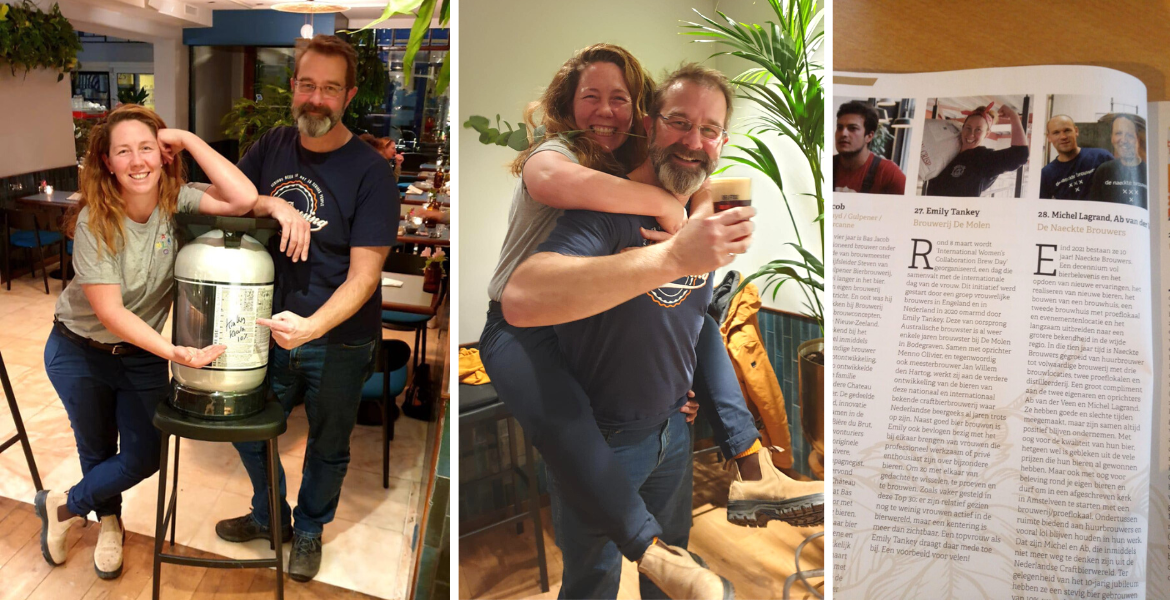
While she appreciated their support, the pushback and friction they gave was just as valuable in helping her to grow as a brewer.
“Anything I wanted to do, they’ve already done before at one of their Borefts festivals. With my recipe development, I’d take [Menno] a recipe, he’d write on it: ‘Been there, done that, you could try this.’ He’d say, ‘This was the result. Maybe you should go research this and find out why.’ Without telling me what to do, he’d give me notes, and I learnt more technical knowledge.
“That’s why Hopes & Dreams is named in the De Molen style. It’s a nod to everything they’ve given me in their knowledge and time and generosity.”
(Emily also cheekily calls Menno "the crusher of hopes and dreams", since he constantly responded to her new ideas with an abrupt: "I’ve already done it.")
One of the skills for which Emily is most grateful is the ability to write and appreciate base recipes.
“John and I often talked about what makes a good beer, and he is adamant that base recipes are a forgotten art form.
“People are so quick to make additions, they forget that you can just manipulate your malt bill. You can make a hundred different beers in your stout style with your malt profiles, temperatures… the flavour differences are phenomenal.
“There’s so much much variety in that spectrum, even sticking within your guidelines, and I think people have forgotten that. I think when people think of classic styles they think of Belgian beers, but I think of red IPA as a classic style, and pale ales… I want to see people making advantage of these styles.”
Emily’s time in the Netherlands also gave her a fresh perspective on the Australian beer industry.
“I think Australians have a natural gift for excellence; I think we have a natural curiosity. We’re abundant in beautiful things in Australia. We have an appreciation for things that are well grown, or well crafted.”
Both her time working in a craft beer bar over there, and the wide exposure to different kinds of beers she received at De Molen’s annual Borefts festival where brewers are invited from around the world to showcase beers, gave her great confidence in the scene back home.
“I think Australia mixes it on the world stage,” she says. “I’ve had beers out of Belgium and the US and the Australian local market, and in real life, we can compete. The upper echelon of Australian brewers are producing beers that mean there’s no need for beers from America. We saw that with the Carwyn Collaborational. If you go side by side, we’re not lacking with everything.
“We’re just lacking with depth [and] with technical knowledge. That just takes time.”
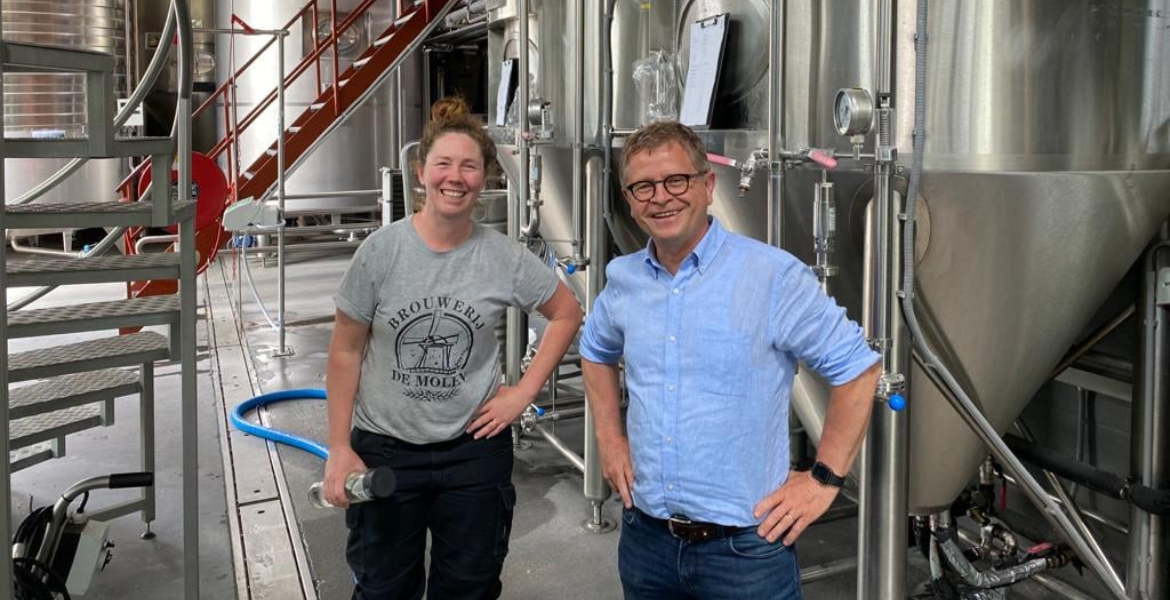
ON FEMALE OWNERSHIP IN BREWING
“I never wanted female ownership to be a huge thing, but it is actually a huge part of why I’m doing [Better Together].
“Female visibility in ownership roles is really lacking. And while I didn’t want it to be one of the main reasons to start a brewery, after thinking about it, it’s probably the main reason that I’m doing it.”
While Emily had been wanting to start her own brewing company for some time, the conversations that have built over the past few years around gender diversity in the beer industry nudged her to action.
“The push came for me when I was reading the results of the diversity survey in Australia. Now is the time to do it. It’s never been a better time. It’s visibility of women, and the challenges and obstacles they face in the industry. And there’s traction for it. Hearing the other women come out and tell their experiences – and there are so many women who don’t want to speak out and be labelled as someone who’s ‘difficult’.”
Since there’s a dearth of breweries owned and led by women, Emily took the responsibility of starting a brewing company seriously – so much so that she even politely declined an offer of investment from a male friend.
At times, she’s questioned whether her brewing company will make any difference in the scheme of things.
“Is being visible in an ownership space enough? Will it have any impact?”
In the end, she decided that it’s definitely a step worth taking.
“It’s not curing cancer, but it’s something that’s important in our industry, and something that needs to be done. Conversations are being had over multiple platforms. And we need to keep that momentum.”
While Emily didn’t plan to start a brewing company with the intention of being an activist for gender diversity in the Aussie beer industry, she’s well aware of and ready to join the conversation – even though she knows it won’t be easy.
“My background as a female owner, it’s going to thrust me into that position involuntarily. I’m happy to be in that position, but it will be a bit tiring as well.”
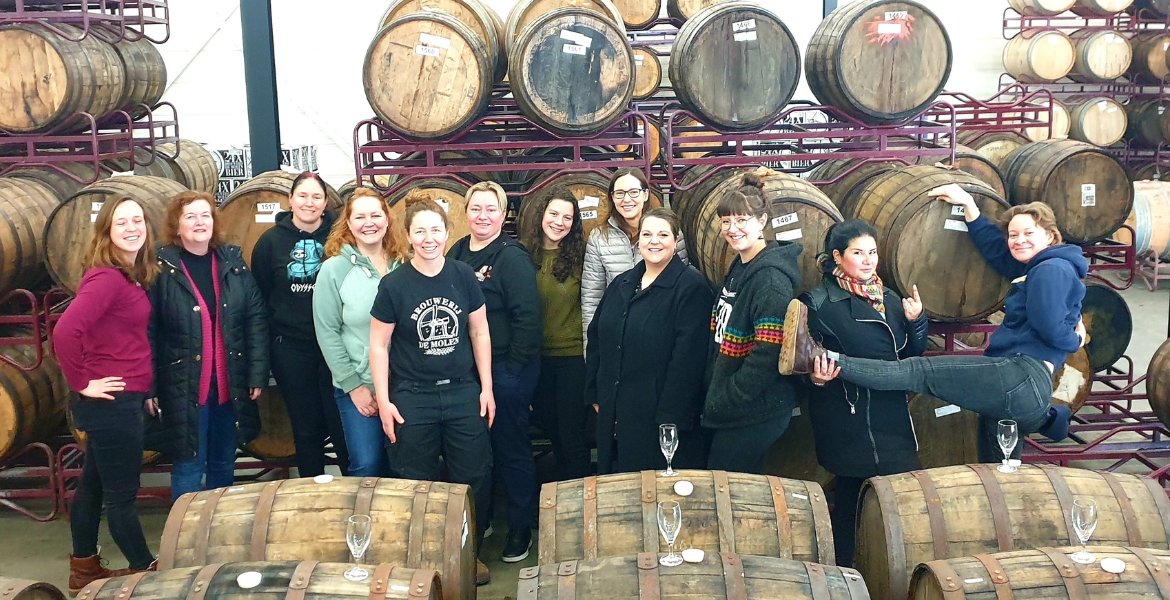
ON CONTRACT BREWING
“The two things that are important to me are female ownership in brewing, and you don’t need your own stainless.”
In the Aussie beer scene, the idea of a contract brewery – that is, one that doesn’t have its own physical brewery, and produces all (or most) of its beer at other breweries – is often looked down upon.
Possibly the biggest thing that has sullied the concept of contract brewing is the prevalence of brands owned and run by people who aren’t themselves passionate or knowledgeable about beer. In this case, they’ve brought only business or marketing acumen – and typically money – to the project while everything on the recipe development and brewing side of things is taken care of by someone else. To put it bluntly: "You make the beer. I’ll slap a label on it."
This doesn’t mean the beer is bad; after all, the beer is still made by skilled brewers. But in an industry that cares about the passion and integrity of craft breweries and their owners – and in which the story of a brand really matters – it can be seen as disingenuous, as clashing with some of the core values of the craft beer community.
As a result, contract brewing in general has a bad rap in Australia. But this prejudice isn’t true the world over: you need only look at the likes of Omnipollo, Mikkeller and Evil Twin to see passionate brewers who built their businesses and worldwide reputations by brewing on other breweries’ equipment. Even one of Emily's Australian inspirations, Boatrocker, got their start via contract brewing before investing in their own brewery and, later, barrel room.
In other words, it’s absolutely possible to have contract brewing companies run by passionate and skilled brewers. And so Emily pushes back, saying that not all contract brewing should be tarred with the same brush.
“I think there needs to be a mind shift,” is how she puts it. “There needs to be a difference between contract brewers who have limited access to capital, and contract brewers [for whom] it’s just marketing.
“There needs to be education. I’d like to convey that.”
In an industry in which finance can be a huge barrier to people wanting to start their own venture, contract brewing has a lower bar for entry.
“Anyone who works as a brewer is never going to have the capital to open their own brewery. The outlay is ridiculous. And if you do invest in stainless steel on a small scale, you’re never going to be producing enough to recoup that sort of money.”
Emily’s time in Europe gave her a fresh perspective on contract brewers as she had the opportunity to see many excellent ones in action, including John Brus’ own project Delftse Brouwers.
“John has a tiny 500-litre kit, three fermenters, and contracts bigger batches… and I’ve never had a bad beer from him.”
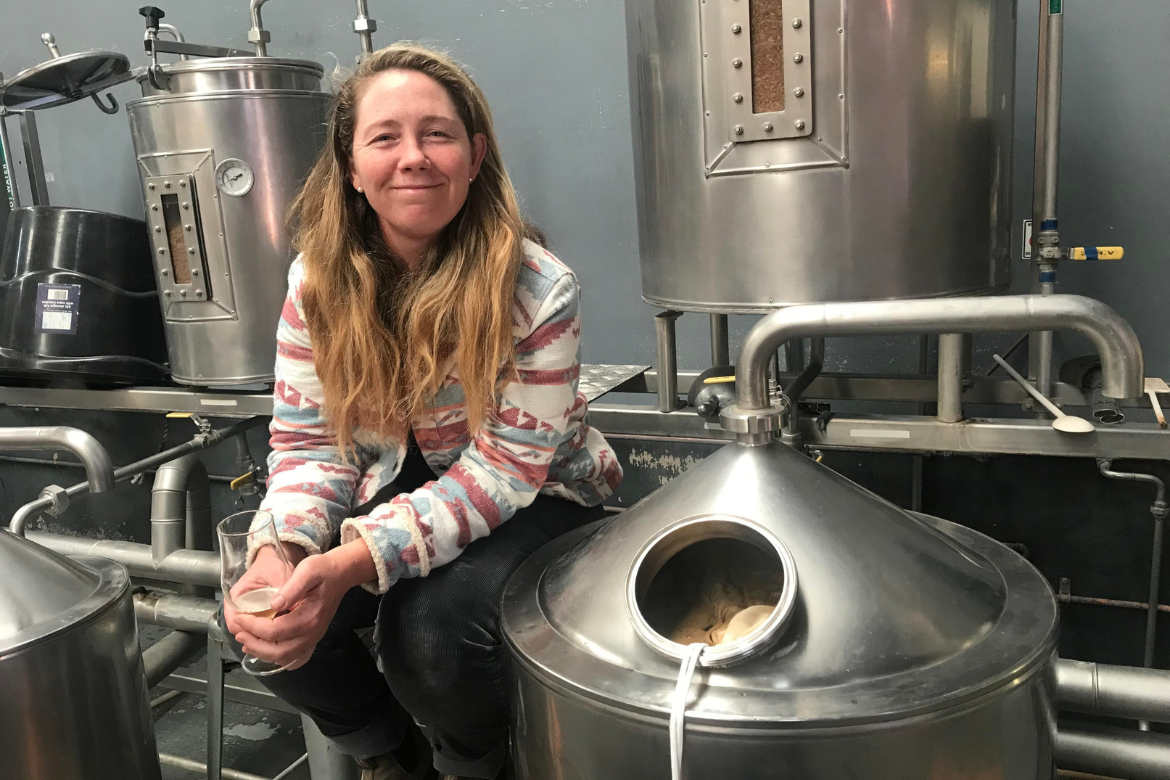
So when it came time to start her own brewing company, Emily saw contract brewing as a no-brainer. She’s putting a little capital into her barrel facility – a concrete slab, some climate control and a handful of barrels cost a lot less than a production brewery – and is currently brewing her small batches at Bacchus (it’s fitting that this partnership began with three imperial stouts) and contracting larger batches at Sea Legs.
“I feel comfortable having my beers made there,” she says. “I have a lot of respect for Abby and Em as ‘women in the industry’, but they’re just good at their jobs!”
In time, she’d like to follow John’s example and get her own small brewhouse. This is partly to give her more flexibility with her smaller batches, but she also sees it as a chance to provide a space for other brewers – particularly women – to try their hand at contract brewing as well.
“I’d love to have a small brew facility at the farm: a 500-litre kit, where women in the industry can come brew a batch. With most contract brewing, you have to do at least 2,000 to 4,000 litres and have your own cold storage.”
Emily is also keen for people to ask questions of a contract brewing company before either accepting or dismissing it: “You’re a contract brewer, but do you have a background in brewing? Do you just not have enough capital? Or just a marketing background?”
She’s hoping this helps to create a shift in perception that would allow more brewers to run successful contract brewing outfits. As for Better Together, Emily is confident she can make her mark in the Queensland beer scene without her own stainless.
“I know in the craft community of Brisbane I probably won’t find a barrier,” she says. “I have experience, I have knowledge, I have passion. I think that converts.”
Better Together beers are available on tap at Bosc, and you can follow Emily's fledgling Instagram @bettertogetherbrews.
*A decent chunk of our conversation was just us geeking out about Boatrocker, and Emily admitting how many Boatrocker beers she has hoarded at Bosc. Hint: it's a big number.



